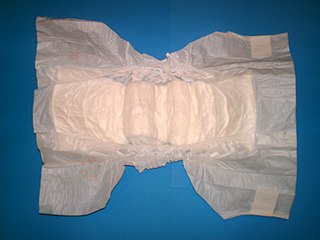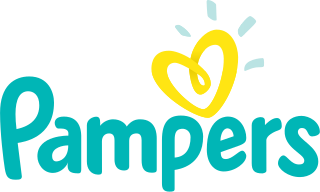Related Research Articles

A diaper /ˈdaɪpə(r)/ or a nappy is a type of underwear that allows the wearer to urinate or defecate without using a toilet, by absorbing or containing waste products to prevent soiling of outer clothing or the external environment. When diapers become wet or soiled, they require changing, generally by a second person such as a parent or caregiver. Failure to change a diaper on a sufficiently regular basis can result in skin problems around the area covered by the diaper.

Recycling is the process of converting waste materials into new materials and objects. The recovery of energy from waste materials is often included in this concept. The recyclability of a material depends on its ability to reacquire the properties it had in its original state. It is an alternative to "conventional" waste disposal that can save material and help lower greenhouse gas emissions. Recycling can prevent the waste of potentially useful materials and reduce the consumption of fresh raw materials, thereby reducing: energy usage, air pollution, and water pollution.

Waste management includes the processes and actions required to manage waste from its inception to its final disposal. This includes the collection, transport, treatment and disposal of waste, together with monitoring and regulation of the waste management process and waste-related laws, technologies, economic mechanisms.

Greenwashing, also called "green sheen", is a form of marketing spin in which green PR and green marketing are deceptively used to persuade the public that an organization's products, aims and policies are environmentally friendly.

In the field of waste management, extended producer responsibility (EPR) is a strategy to add all of the environmental costs associated with a product throughout the product life cycle to the market price of that product. Extended producer responsibility legislation is a driving force behind the adoption of remanufacturing initiatives because it "focuses on the end-of-use treatment of consumer products and has the primary aim to increase the amount and degree of product recovery and to minimize the environmental impact of waste materials".

Pampers is a brand of baby and toddler products marketed by Procter & Gamble.
A sustainable business, or a green business, is an enterprise that has minimal negative impact or potentially a positive effect on the global or local environment, community, society, or economy—a business that strives to meet the triple bottom line. They cluster under different groupings and the whole is sometimes referred to as "green capitalism." Often, sustainable businesses have progressive environmental and human rights policies. In general, business is described as green if it matches the following four criteria:
- It incorporates principles of sustainability into each of its business decisions.
- It supplies environmentally friendly products or services that replaces demand for nongreen products and/or services.
- It is greener than traditional competition.
- It has made an enduring commitment to environmental principles in its business operations.
Green brands are those brands that consumers associate with environmental conservation and sustainable business practices.

Reuse is the action or practice of using an item, whether for its original purpose or to fulfil a different function. It should be distinguished from recycling, which is the breaking down of used items to make raw materials for the manufacture of new products. Reuse – by taking, but not reprocessing, previously used items – helps save time, money, energy and resources. In broader economic terms, it can make quality products available to people and organizations with limited means, while generating jobs and business activity that contribute to the economy.

Waste minimisation is a set of processes and practices intended to reduce the amount of waste produced. By reducing or eliminating the generation of harmful and persistent wastes, waste minimisation supports efforts to promote a more sustainable society. Waste minimisation involves redesigning products and processes and/or changing societal patterns of consumption and production.
The Estonian Greens is an Estonian green political party. Founded in 1989, the party held six seats in the Riigikogu from 2007 to 2011. Its objective is to ensure that Estonia's development is environmentally friendly, sustainable, politically stable and economically efficient.
Design for the Environment (DfE) is a design approach to reduce the overall human health and environmental impact of a product, process or service, where impacts are considered across its life cycle. Different software tools have been developed to assist designers in finding optimized products or processes/services. DfE is also the original name of a United States Environmental Protection Agency (EPA) program, created in 1992, that works to prevent pollution, and the risk pollution presents to humans and the environment. The program provides information regarding safer chemical formulations for cleaning and other products. EPA renamed its program "Safer Choice" in 2015.
Sustainable advertising addresses the carbon footprint and other negative environmental and social impacts associated with the production and distribution of advertising materials. A growing number of companies are making a commitment to the reduction of their environmental impact associated with advertising production and distribution.
This is a glossary of environmental science.

The Procter & Gamble Company (P&G) is an American multinational consumer goods corporation headquartered in Cincinnati, Ohio, founded in 1837 by William Procter and James Gamble. It specializes in a wide range of personal health/consumer health, and personal care and hygiene products; these products are organized into several segments including Beauty; Grooming; Health Care; Fabric & Home Care; and Baby, Feminine, & Family Care. Before the sale of Pringles to Kellogg's, its product portfolio also included food, snacks, and beverages. P&G is incorporated in Ohio.

Waste are unwanted or unusable materials. Waste is any substance which is discarded after primary use, or is worthless, defective and of no use. A by-product by contrast is a joint product of relatively minor economic value. A waste product may become a by-product, joint product or resource through an invention that raises a waste product's value above zero.
Deborah Ann "Deb" Henretta is an American businesswoman. She is a senior adviser for General Assembly, a global education and technology company, as well as SSA & Company, a New York-based management consulting firm. Prior to her current position, she retired in 2015 from a 30-year career at Procter & Gamble, culminating in becoming one of only two top-level women executives for the consumer goods organization.

A disposable cup is a type of tableware and disposable food packaging. Disposable cup types include paper cups, plastic cups and foam cups. Expanded polystyrene is used to manufacture foam cups, and polypropylene is used to manufacture plastic cups.
Essity AB is a global hygiene and health company, with its headquarters in Stockholm, Sweden. The products portfolio contains one-use products such as tissue paper, baby diapers, feminine care, incontinence products, compression therapy, orthopedics and wound care. Essity was a part of the hygiene and forest products company SCA until 2017, when the company spun off the hygiene operations that became listed as a separate company on Nasdaq Stockholm.
References
- 1 2 3 "Decision: Earth". Education Resources Information Center . Retrieved 18 January 2011.
- 1 2 3 Sharon Beder (1997). "Corporate Manipulation of Science Education". ABC Online . Australian Broadcasting Corporation . Retrieved 18 January 2011.
- 1 2 "Business :: Corporate Teaching Aid Gets Low Marks -- Procter & Gamble Text Says Clear Cutting OK For Environment". The Seattle Times . January 20, 1994. Retrieved 18 January 2011.
- ↑ Clifford, Frank (November 13, 1995). "Battle Over Environment Moves to the Classroom". Los Angeles Times .
- ↑ name="ABC(Australia)_www.abc.net.au_science_slab_beder"